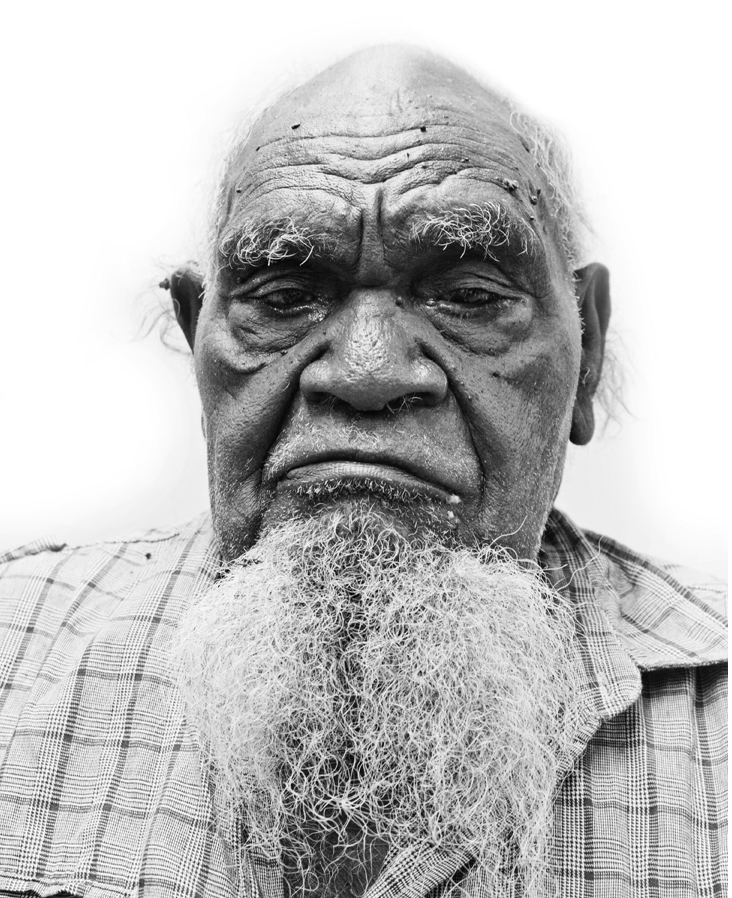ROBIN KANKAPANKATJA (dec)
Walalkara
KALRKA8595P (2012)
Acrylic on Belgian Linen
152 x 102cm | 59.84 x 40.16in
Kaltjiti Artists
ENQUIRE
ROBIN KANKAPANKATJA (dec)
Nyangatja ngayuku ara irititja
KALRKA8653D (2012)
Dry Pastel, Graphite and Charcoal on Arches Paper
90 x 65cm | 35.43 x 25.59in
Kaltjiti Artists
ENQUIRE
ROBIN KANKAPANKATJA (dec)
Nyangatja ngayuku ara irititja
KALRKA8386D (2012)
Oil Stick on Paper
65 x 45cm | 25.59 x 17.72in
Kaltjiti Artists
ENQUIRE
While his family were moving from Makiri to Mimili, Kunmanara Tjilpi Kankapankatja was born at Walalkara.
He saw a ‘whitefella’ for the first time at Shirley Well when he was a young teenage boy. As a young man,he worked with cattle at Welbourne Hill and Everard Park.
He grew up around Wellborne Hill, and Everard Park stations learning from his father.
He knows the tjukurpa stories around the mountains at Mimili and all the southern area from west to east.
His father was Pitjantjatjara from west of Watarru and his mother was Yankunytjatjara from Makiri to the north west of Walalkara.
Unusually, Kunmanara Tjilpi Kankapankatja is custodian for country that involves women's law - minyma tjukurpa.
Ililya and Puni Puni are two such places that feature in his paintings. Walalkara is where he lived with his wife Tjayangka (Antjala), His three children, four grandchildren and two great grandchildren often stay with him and help with land management work.
This is the Yankunytjatjara country of the artist Kunmanara Tjilpi Kankapankatja and his family.
They are nguraritja, the people who belong to this south country of Walalkara. Kunmanara Tjilpi Kankapankatja was an artist and painter of very recent times – July 2004.
His theme is always his traditional country, Walalkara and Ililya.
He was also an expert carver and makes traditional artefacts such as boomerangs, spears, spear throwers and shields. In his naïve, fresh style, he tells the story of his country.
An expert tracker, his intimate knowledge of the animals and plants of his country is evident from the way he depicts the images of the trees, animal tracks and landmark creeks, rockholes and hills. " He creates maps of his country with and easy sense of space and openess." (Diana James - Painting the Song: Kaltjiti Artists of the Sand-dune Country.) Walalkara Country is 700,000 hectares of the Great Victoria Desert protected as the Walalkara Indigenous Protected Area (IPA), 65 kilometres south west of Kaltjiti in the Anangu Pitjantjatjara Yankunytjatjatjara (APY) Lands far north of South Australia..
While his family were moving from Makiri to Mimili, Kunmanara Tjilpi Kankapankatja was born at Walalkara.
He saw a ‘whitefella’ for the first time at Shirley Well when he was a young teenage boy. As a young man,he worked with cattle at Welbourne Hill and Everard Park.
He grew up around Wellborne Hill, and Everard Park stations learning from his father.
He knows the tjukurpa stories around the mountains at Mimili and all the southern area from west to east.
His father was Pitjantjatjara from west of Watarru and his mother was Yankunytjatjara from Makiri to the north west of Walalkara.
Unusually, Kunmanara Tjilpi Kankapankatja is custodian for country that involves women's law - minyma tjukurpa.
Ililya and Puni Puni are two such places that feature in his paintings. Walalkara is where he lived with his wife Tjayangka (Antjala), His three children, four grandchildren and two great grandchildren often stay with him and help with land management work.
This is the Yankunytjatjara country of the artist Kunmanara Tjilpi Kankapankatja and his family.
They are nguraritja, the people who belong to this south country of Walalkara. Kunmanara Tjilpi Kankapankatja was an artist and painter of very recent times – July 2004.
His theme is always his traditional country, Walalkara and Ililya.
He was also an expert carver and makes traditional artefacts such as boomerangs, spears, spear throwers and shields. In his naïve, fresh style, he tells the story of his country.
An expert tracker, his intimate knowledge of the animals and plants of his country is evident from the way he depicts the images of the trees, animal tracks and landmark creeks, rockholes and hills. " He creates maps of his country with and easy sense of space and openess." (Diana James - Painting the Song: Kaltjiti Artists of the Sand-dune Country.) Walalkara Country is 700,000 hectares of the Great Victoria Desert protected as the Walalkara Indigenous Protected Area (IPA), 65 kilometres south west of Kaltjiti in the Anangu Pitjantjatjara Yankunytjatjatjara (APY) Lands far north of South Australia..
![Australian Indigenous (Aboriginal and Torres Strait Islander) artwork by ROBIN KANKAPANKATJA of Kaltjiti Artists. The title is Walalkara. [KALRKA8595P] (Acrylic on Belgian Linen)](https://media.redotgallery.com/stockroom/gallery/w/walalkara-2654.jpg)
![Australian Indigenous (Aboriginal and Torres Strait Islander) artwork by ROBIN KANKAPANKATJA of Kaltjiti Artists. The title is Nyangatja ngayuku ara irititja. [KALRKA8653D] (Dry Pastel, Graphite and Charcoal on Arches Paper)](https://media.redotgallery.com/stockroom/gallery/n/nyangatja-ngayuku-ara-irititja-2655.jpg)
![Australian Indigenous (Aboriginal and Torres Strait Islander) artwork by ROBIN KANKAPANKATJA of Kaltjiti Artists. The title is Nyangatja ngayuku ara irititja. [KALRKA8386D] (Oil Stick on Paper)](https://media.redotgallery.com/stockroom/gallery/n/nyangatja-ngayuku-ara-irititja-2653.jpg)
